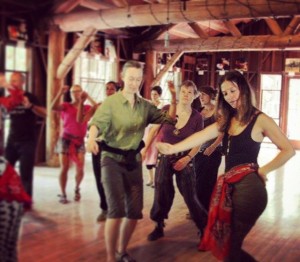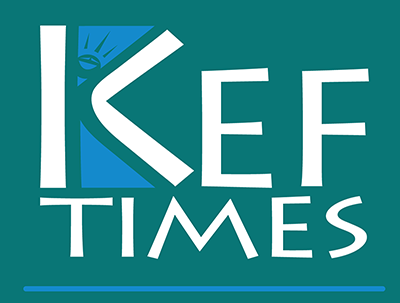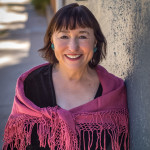
Nicolle Hoffschneider in the dance hall at Mendocino (in foreground, with red sash around waist).
Location: Oakland, Calif.
Occupation: I work a full-time day job as a marketing coordinator for one of the oldest architecture firms in the Bay Area (HKIT Architects). I also teach belly dance at ODC in San Francisco weekly on Wednesday nights from 7:45 to 9:15 p.m. and I have biweekly gigs at various hookah lounges and restaurants in San Francisco (Marrakech, Fog City Hookah). In addition, I am working as a co-director and choreographer for a San Francisco-based belly dance theater company founded by Jill Parker, (Little Egypt).
Connection to Balkan music/dance: I try to interject Balkan music and dance into my life on a daily basis. First of all, since camp, I have been listening to Balkan music almost every day. I continue to study the dances and incorporate them into my choreographies when they make sense to do so. I refer back to notes or videos from camp to help me with this and I can’t wait to go back again in the upcoming years to learn more. It’s also wonderful to live in the Bay Area and have so much going on here in terms of Balkan music and folk dancing—Ashkenaz, Balkan Sundays at Café Revolution—I try to attend shows and support the community as much as I can.
I also enjoy being on the EEFC mailing list and I am so inspired by the knowledge this community shares collectively. There should be a worldwide email list for (almost) everything—it’s really an incredible community that is out there—I have used the list to get lyrics translations or find out more about specific dances, and I am so grateful for all of you who are sharing your knowledge through the email list and keeping these dances, music and knowledge of culture alive.
Lastly, I’m hoping to travel to the Balkans in the next year or two in order to immerse myself and have a deeper understanding of various cultures, music, dances and the roots of something I’ve become so passionate about here in California. I hope to line up some teachers for various dances, and perhaps attend a festival—and definitely surround myself with music as much as possible.
Number of times at Balkan camp: This was my first time at camp. I attended three music/dance camps this year that were all wonderful, but Balkan camp may have taken the cake!
Studied at camp: I attended camp planning to exclusively take dance classes. As a dancer, this is clearly where my comfort zone lies. However, I brought a darbuka/doumbek just in case and when I got to camp, I ended up sticking around on the first day for Vlado [Pupinoski]’s ensemble class and was able to play percussion with them and perform with them at the end of the week (thanks to moral support from Michele Simon and from everybody in the group being so wonderful and welcoming). I also attended Joe [Graziosi]’s Greek dancing classes, Alex [Marković]’s dance classes, and thoroughly enjoyed studying Turkish Roman dance with Jessaiah [Zuré], who is an incredible dance teacher—and who really pushed me hard in her classes and inspired me to work harder as a dancer in this style.
Memorable moment at camp: There are too many things that touched me to just name one! I loved that camp is so open and welcoming to everybody. I didn’t expect to play in an ensemble but by the end of the week I was jamming with Vlado and his group and learning new rhythms on the darbuka that I now recognize when I hear them in Balkan tunes. I’m grateful for that opportunity because it pushed me out of my comfort zone and taught me something new.
I also love how the kafana is so open and inviting to everybody. It was a space where we could all share our creativity and music with one another—even if it was outside of the Balkan genre. It was amazing and incredibly inspiring to see the talent that came out of that space and how we transformed that little room into a special place for the week, giving it an entirely new atmosphere and energy that will always be unique to it for that one week in time—we each added to this in our own way and I’ll always have a special memory of what that space became for the week.
There are so many other things to say here, but I want to give a special shout-out to the incredible teachers that this camp brings us. You are all world-class, top-notch, incredible musicians, teachers, dancers, scholars and just awesome people. I was inspired by each and every one of you and thank you so much for taking the time to come to camp and making it such a wonderful place.


